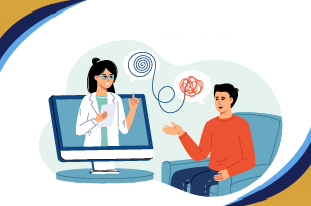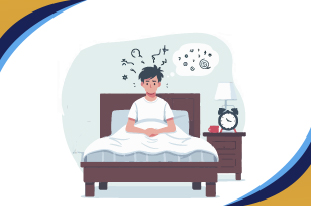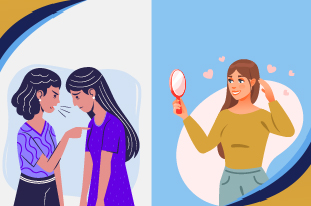Depression is a mental disorder that makes millions of people feel sad, hopeless, and unable to take part in activities that once gave them pleasure. Depression is known to make everything you do very overwhelming, and if you or someone close to you has been battling with this, then it is possible to manage stress, and knowing how to do that will make you feel like an average person again.
This blog presents some of the most useful and scientifically supported healthy coping mechanisms for depression.
Understanding Depression
It is, however, essential to have a pretty good idea of what depression is before moving on to depression coping mechanisms. Depression or major depressive disorder is not about being depressed with a few moments in life or even having a bad day. This includes a low mood, which could persist for weeks, months, or even years. Policies include fatigue, decreased energy, reluctance to do anything, and pervasive feelings of guilt or worthlessness. The symptoms of depression not only make an impact on mental health but also contribute to the patient’s physical state of well-being, possibly including sleeping disorders, changes in appetite, and fatigue.
People with depression have a disorder that is to be treated and is not something one chooses to do or can simply overcome. Most of the time, it must be addressed with the help of therapy, medication, and various practices. As far as assistance from professionals is concerned, the mentioned coping skills for depression below are also intended to support those and encourage people to take an active role in combating their mental disorders.
Read More: Understanding The Connection Between Male Depression And Emotional Affairs
-
Building a Routine
As every person who suffers from depression realizes, the problem is in the absence of any structure in everyday life. Major depression leaves away every desire to do anything, not even getting out of bed or taking a shower. As in all cases, having order in one’s life means a lot, so based on some ideas, one has to define several daily routines that can give a sense of meaningfulness, which means feeling less chaotic.
How to Build a Routine:
- Start Small: Start with basic skills such as waking up at the same time each day or even having a regular mealtime. Paying attention to the small details can help you learn much, even from the most unexpected places.
- Prioritize Self-Care: Do not forget to do things like washing, eating, and sleeping between the set activities in the day. Physical body care is also vital for mental health.
- Incorporate Enjoyable Activities: It might be tough to find small moments of joy; add some things you once liked, such as reading a book, walking, or listening to music. Stimulating activities positively transform the patient’s general health over time.
-
Physical Exercise
Physical activity is arguably the best depression coping skill. Milder forms recommend physical exercise for feeling good because, as already mentioned, it produces endorphins in the brain. Additionally, exercise is as effective as medicines, especially for those patients who experience mild to moderate levels of depression.

Tips for Exercising with Depression:
- Start Slow. Because depression wears you out, begin with tasks you know you can accomplish. Short activities can work wonders. A few minutes of walking outside can perk you up.
- Find What You Enjoy: Exercise shouldn’t be hitting the gym. Move more through dancing, swimming, yoga, or biking; do what feels best.
- Set Realistic Goals: Many people who take up exercise regimes fail because they need to be realistic about their exercise ability. If, for instance, you set very high standards for yourself, this often leads to frustration. Celebrate small victories!
-
Mindfulness and Meditation
Meditation and mindfulness should be used in the treatment of depression. Mindfulness is the act of being conscious of the current moment without passing any judgment. At the same time, meditation, which is also exercise for the brain, includes breathing and thinking to reduce stress. Hence, the two practices can be effective in managing not only negative thoughts but also increasing self-identification.
How to Practice Mindfulness:
- Begin with Breathing: Focus on your breathing. When you find it challenging to continue, take a deep breath and sit down for a while. This can help decrease anxiety, and social anxiety and make you more conscious of the present. Moreover, the technique helps with panic disorder and signs of major depressive disorder.
- Use Mindfulness Apps: Headspace, Calm, Insight Timer, and others are the most popular meditation apps that are good if you want to figure out how to meditate and maintain mindfulness daily.
- Focus on Your Senses: When you are in a low mood, describe to yourself what you can see, smell, hear, touch, and taste. This can help bring you back to the present and prevent thoughts of depression from entering your head.
Read More: Major Depressive Disorder In Children: A Guide For Parents
-
Social Connection
Cognitive Complication of Depression and the Treatment of Social Withdrawal Depression makes people feel like they want to be alone, but it is detrimental in the long run. People need social interaction, and building relationships is much more than getting through the day as they offer comfort and acceptance. Most people understand that contacting other individuals in any way is helpful for the health of the mind.
Ways to Reconnect with Others:
- Talk to a Friend: Chat can be helpful, even if it’s just a five-minute conversation about your feelings.
- Join a Support Group: There are support groups for individuals with depression in many communities and online forums where those people can find company in their search for support.
- Engage in Activities Together: People often do not have to discuss depression when socializing. Forcing the interaction by going for a movie or a walk in the park with someone is less stressful than sitting and having a boring conversation.
-
Journaling
We are often encouraged to write to express ourselves, and that writing can help heal the soul. Journaling can include thoughts that seem complicated to share face-to-face; therefore, you can do some journaling.
Tips for Effective Journaling:
- Write Freely: There is no need to focus on definite grammar rules and language structure. The purpose is to communicate without getting into any evaluations.
- Use Prompts: If you don’t know where to begin, try using prompts such as, ‘How do I feel today?” or ‘Three things that I am thankful for?’
- Track Your Progress: Reading over personal entries made at different times is another way of identifying mood patterns and likely causes in the long run. This awareness can help one manage one’s condition well.
-
Healthy Eating
It’s a fact that the kind of foods you eat will determine your mood and energy level throughout the day. For instance, eating well-balanced meals goes a long way in improving one’s health and assists in controlling depression. Some nutrients, including omega-3 fatty acids, vitamins, and minerals, are suitable for your brain and can help you boost your mood.
How to Improve Your Diet:
- Avoid Processed Foods: Increased consumption of processed foods and sugar or caffeine results in fatigue and mood changes. Diet patterns should encompass more food products such as fruits, vegetables, lean proteins, and whole grains.
- Eat Regularly: Inadequate and irregular eating is known to worsen the signs of depression, depending on the situation. It is better to divide the day into several meals and choose food that helps increase the body’s energy level.
- Stay Hydrated: This common condition impedes your ability to think and even change your feelings. Ensure the body is well hydrated all day.
-
Seek Professional Help
Though self-care and coping tools are necessary, they should not be misconstrued as options for professional help. Depression is a severe state that frequently demands treatment from a therapist, counselor, or psychiatrist. If you believe that is insufficient, it is always good to consult a professional who will help you overcome the situation.
Types of Professional Help:
- Cognitive Behavioral Therapy (CBT): What is more than individual therapy, commonly used in treating depression and is highly effective is CBT. It is based on the conception that specific patterns of thinking lead to depression and working on these negative thoughts by turning them into positive ones is compulsory.
- Medication: Antidepressants, which are doctor-prescribed, can balance chemicals in the brain and put a positive effect on your mood. This is especially so because diet is an essential factor and could interact with your medication and the withdrawal symptoms where you may need to quit taking a particular drug despite being on another medication that it may interact with.
- Talk Therapy: Therapists suggest it is helpful to talk with them, discuss their feelings, and find more ways to help manage them.
Read More: What’s The Difference Between A Mood Disorder And A Personality Disorder?
Conclusion: Taking Steps Toward Healing
As we know, depression is a challenging experience, but with the correct strategy, one can be able to deal with the symptoms and subsequently gain mastery over the problem. By creating a structure, exercising, doing positive coping strategies for depression, and connecting, you can make a box of tools for dealing with depression. Moreover, you do not need to recover independently; getting help from professionals and telling people close to you is also effective. Everyone is not gifted in the same way. If you have not been successful in finding ways to battle depression, do not lose hope. If you are experiencing the signs of depression and seeking a complete guide on dealing with the harsh signs of depression, then do not hesitate to connect with telehealth services of Orange Coast Psychiatry.
























